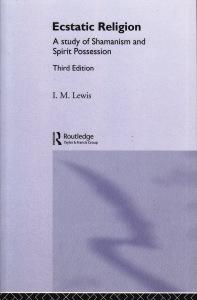 Don’t complain. So I’m told. Work with the system (i.e., the privileged), do your part, and most of all, don’t complain. What would Jeremiah do? Or any of the prophets? It seems to me that prophets had the job of calling out where society had gone wrong and doing so with a healthy dose of complaint. If you don’t call out evil, it only grows. Prophets come to mind because I’ve just finished reading I. M. Lewis’ Ecstatic Religion: A Study of Shamanism and Spirit Possession. Spirit possession is chic, at least in the horror movie industry, but if you get beyond the stereotypes, you soon learn that inspired, or ecstatic, religion is largely based on good possession. The gods can temporarily inhabit the shaman, and, as Lewis points out, there is often an element of the underprivileged being those who are visited by the gods. Interestingly enough, indigenous cultures that feature shamans—or shaman-like practitioners—accept the rebuke of the gods, even when it may be a thinly veiled attempt to right an obvious wrong.
Don’t complain. So I’m told. Work with the system (i.e., the privileged), do your part, and most of all, don’t complain. What would Jeremiah do? Or any of the prophets? It seems to me that prophets had the job of calling out where society had gone wrong and doing so with a healthy dose of complaint. If you don’t call out evil, it only grows. Prophets come to mind because I’ve just finished reading I. M. Lewis’ Ecstatic Religion: A Study of Shamanism and Spirit Possession. Spirit possession is chic, at least in the horror movie industry, but if you get beyond the stereotypes, you soon learn that inspired, or ecstatic, religion is largely based on good possession. The gods can temporarily inhabit the shaman, and, as Lewis points out, there is often an element of the underprivileged being those who are visited by the gods. Interestingly enough, indigenous cultures that feature shamans—or shaman-like practitioners—accept the rebuke of the gods, even when it may be a thinly veiled attempt to right an obvious wrong.
Shamanism is a bit of a misnomer. Not really a religion, but a set of spiritual practices originating among the Tungus of Siberia, shamanism is now conveniently applied to native peoples around the world. In our love of easy classification, we like to say this belief is similar to that belief, so they must be a type of religion. In fact, however, “religion” is much more integrated into the daily lives of indigenous peoples and specific beliefs vary widely. Nevertheless, we understand possession and shamanism, and we apply them as categories to try to make sense of it all. Lewis does so with an anthropologist’s eye, finally in the last chapter addressing the psychological questions. It is often claimed, for instance, that shamanism is a form of mental illness. What seems clear to me is that shamans are responsible for preventing injustice from getting too far established.
And that brings me back to prophets. Prophets, particularly among those who study the Bible, are often seen as religious authorities. It seems to me that prophets, as opposed to priests, grew out of the untamed concern for justice typically exhibited by shamans. Priests are establishment religionists. They support the government and the government supports them. Temples are built. Religion is regularized. Prophets, however, can come from anywhere. They are liminal figures, complaining, in God’s name, when injustice appears. They don’t support the status quo just because it makes people comfortable. In other words, complaint is often the only way to make the divine will known. They are the heirs of the shamans. One thing that’s pretty obvious—whether you live in Siberia, Israel, or America—shamans are still sorely needed.
